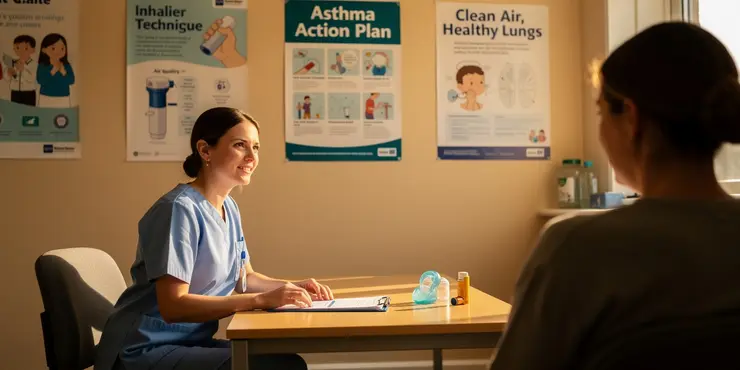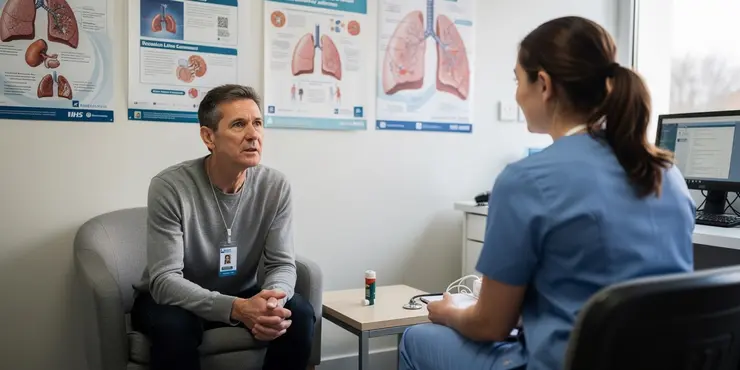
Find Help
More Items From Ergsy search
-

What is Asthma?
Relevance: 100%
-

What causes asthma?
Relevance: 95%
-

Are there different types of asthma?
Relevance: 95%
-

Can asthma be cured?
Relevance: 95%
-

Can asthma be fatal?
Relevance: 95%
-

How is asthma treated?
Relevance: 95%
-

Is asthma a serious condition?
Relevance: 95%
-

How is asthma diagnosed?
Relevance: 94%
-

What is an asthma action plan?
Relevance: 92%
-

Can diet affect asthma?
Relevance: 91%
-

An Asthma Explainer with Dr Katherine Hickman
Relevance: 91%
-

What triggers asthma attacks?
Relevance: 91%
-

What are the common symptoms of asthma?
Relevance: 91%
-

Are inhalers the only treatment for asthma?
Relevance: 91%
-

Can children outgrow asthma?
Relevance: 91%
-

Can stress cause asthma symptoms?
Relevance: 88%
-

Is there a link between hay fever and asthma?
Relevance: 88%
-

How can asthma attacks be prevented?
Relevance: 87%
-

Can exercise trigger asthma symptoms?
Relevance: 87%
-

Is asthma more common in certain age groups?
Relevance: 85%
-

How does air pollution affect asthma?
Relevance: 85%
-

How often should someone with asthma see a doctor?
Relevance: 83%
-

Can dust mites cause asthma and eczema?
Relevance: 79%
-

Rise in Childhood Asthma Linked to Air Pollution in Urban Areas
Relevance: 78%
-

What are some common pollutants that affect asthma sufferers in urban areas?
Relevance: 78%
-

Are there mobile apps to track air quality and its impact on asthma?
Relevance: 77%
-

Where can I find information on air pollution and its effect on Asthma for my local area?
Relevance: 75%
-

UK Study Links Poor Air Quality to Increased Asthma Cases in Urban Areas
Relevance: 74%
-

Where can I find research studies on air pollution and asthma in my area?
Relevance: 72%
-

How to retrain your breathing | Part 2 | Asthma, long covid or breathlessness
Relevance: 71%
-

What local organizations provide information on air pollution and asthma?
Relevance: 56%
-

What local organizations provide information on air pollution and asthma?
Relevance: 56%
-

How can I reduce my exposure to air pollution if I have asthma?
Relevance: 55%
-

Where can I find general information about air pollution and asthma?
Relevance: 53%
-

Understanding and Managing Respiratory Illnesses in Families
Relevance: 33%
-
Should individuals with certain medical conditions avoid aspirin?
Relevance: 33%
-

Clearing Your Chest with Breathing Exercises
Relevance: 27%
-

What is air physiotherapy?
Relevance: 26%
-

What are some common conditions treated with homeopathy?
Relevance: 26%
-

Who is at risk of developing eczema?
Relevance: 26%
What is Asthma?
Asthma is a chronic respiratory condition that affects the airways, making them inflamed, narrowed, and swollen. This condition can lead to difficulty breathing, wheezing, and coughing. It is a common disease that can affect individuals of all ages but often starts in childhood. Asthma can vary in severity—from mild, which may only require occasional treatment, to severe, which can be life-threatening if not properly managed.
Causes of Asthma
The exact causes of asthma are not completely understood. However, it is believed to result from a combination of genetic and environmental factors. Individuals with a family history of asthma or other related allergic conditions, such as hay fever or eczema, have an increased risk of developing asthma. Environmental factors such as exposure to allergens, pollution, smoking, and respiratory infections during childhood may also trigger asthma.
Symptoms and Triggers
Common symptoms of asthma include shortness of breath, chest tightness, wheezing, and coughing, particularly at night or early morning. Triggers can vary between individuals, but some common ones include pollen, dust mites, animal fur, smoke, strong chemical fumes, and changes in weather. Physical activity and respiratory infections can also exacerbate asthma symptoms.
Diagnosing Asthma
Diagnosing asthma typically involves a thorough review of the patient's medical history, a physical examination, and various lung function tests. Spirometry is a common test used to measure how much air you can exhale after a deep breath and how quickly you can expel it. This helps to determine the severity of asthma and aids in the formulation of a treatment plan.
Treatment and Management
While there is currently no cure for asthma, it can be effectively managed with the right treatments. Asthma patients are usually prescribed inhalers; reliever inhalers are used to quickly alleviate symptoms, whereas preventer inhalers are used daily to reduce inflammation and prevent symptoms. In some cases, tablets or injections may be prescribed for more severe asthma. It's vital for asthma patients to work closely with their healthcare provider to monitor their condition and adjust treatment as needed.
Living with Asthma
Living with asthma involves identifying and avoiding potential triggers, taking prescribed medication as directed, and monitoring symptoms. Asthma action plans developed in collaboration with healthcare providers can help manage the condition effectively and reduce the risk of severe asthma attacks. Education about asthma and support from healthcare providers, family, and support groups can empower individuals to lead full, active lives.
Conclusion
Asthma is a manageable chronic condition that requires ongoing attention to symptoms, triggers, and medication. With proper management, individuals with asthma can control their symptoms and minimize disruptions to daily life. Continued research and awareness efforts are crucial in understanding asthma better and improving the quality of life for those affected.
What is Asthma?
Asthma is a disease that affects your lungs. It makes it hard to breathe. People with asthma can cough and wheeze. It often starts when you are a child, but can happen at any age. Some people have mild asthma, while others have it more seriously.
Causes of Asthma
We don't fully know what causes asthma, but it can run in families. If your parents or siblings have asthma, you might get it too. Things in the air, like smoke or dust, can make asthma worse. Even things like pollen or pets can be a problem.
Symptoms and Triggers
Asthma can make you feel short of breath and tight in the chest. You might hear yourself wheeze when you breathe out. Many people cough a lot at night or early in the morning. Things that make asthma worse are called triggers. These can be pollen, dust, pets, smoke, or even exercise.
Diagnosing Asthma
To find out if you have asthma, a doctor will ask you questions and do some tests. One test is called spirometry. It checks how well your lungs are working. This helps the doctor decide on the best treatment plan for you.
Treatment and Management
There is no cure for asthma, but you can treat it with medicine. Many people use inhalers. A reliever inhaler helps you breathe when asthma acts up. A preventer inhaler used every day can stop asthma from causing problems. Sometimes, people need other medicines if asthma is severe. It's important to work with your doctor to keep asthma under control.
Living with Asthma
If you have asthma, you need to know what your triggers are and stay away from them. Take your medicine as your doctor tells you. Follow an asthma action plan to manage your symptoms. Support from your doctor, family, and groups can help you live a full life.
Conclusion
Asthma needs regular care to handle symptoms and triggers. You can manage asthma well with the right medicines and by knowing what causes your symptoms. With good management, people with asthma can live normal, active lives. Awareness and learning about asthma help improve life for those who have it.
Frequently Asked Questions
What is asthma?
Asthma is a chronic disease that affects the airways in the lungs, causing them to become inflamed and narrow, leading to difficulty in breathing.
What are the common symptoms of asthma?
Common symptoms include wheezing, shortness of breath, chest tightness, and coughing, particularly at night or early in the morning.
What causes asthma?
The exact cause of asthma is unknown, but it is believed to be a combination of genetic and environmental factors.
How is asthma diagnosed?
Asthma is diagnosed through a combination of medical history, physical examination, and lung function tests.
Can asthma be cured?
Asthma cannot be cured, but it can be managed effectively with medications and lifestyle changes.
What triggers asthma attacks?
Common triggers include allergens, air pollution, respiratory infections, physical activity, cold air, and stress.
How is asthma treated?
Asthma is treated with long-term control medications to reduce inflammation and quick-relief inhalers to manage symptoms during an attack.
Is asthma a serious condition?
Yes, asthma can be serious and even life-threatening if not managed properly, but most people can live normal lives with proper treatment.
Can children outgrow asthma?
Some children may experience a decrease in symptoms or outgrow asthma, but for many, it continues into adulthood.
How can asthma attacks be prevented?
Avoiding known triggers, adhering to prescribed medications, and following a personalized asthma action plan can help prevent attacks.
Can exercise trigger asthma symptoms?
Yes, physical activity can trigger asthma symptoms, but with proper management, people with asthma can be physically active.
What is an asthma action plan?
An asthma action plan is a written plan developed with a doctor to help manage asthma and prevent attacks.
Are there different types of asthma?
Yes, there are different types, including allergic asthma, non-allergic asthma, exercise-induced asthma, and occupational asthma.
How does air pollution affect asthma?
Air pollution can irritate the airways and make asthma symptoms worse, leading to increased risk of attacks.
Can diet affect asthma?
A healthy diet can support overall health, but there is no specific diet for asthma. Some studies suggest that certain nutrients might help manage symptoms.
Are inhalers the only treatment for asthma?
Inhalers are the most common treatment, but other options include oral medications, biologics, and lifestyle changes.
Can stress cause asthma symptoms?
Yes, stress and strong emotions can trigger asthma symptoms or make existing symptoms worse.
Is asthma more common in certain age groups?
Asthma can occur at any age, but it often starts in childhood.
Can asthma be fatal?
Asthma can be fatal if not properly managed, but with appropriate treatment, the risk of severe attacks can be greatly reduced.
How often should someone with asthma see a doctor?
It is recommended to visit a doctor regularly to monitor asthma control, typically at least once a year, or more frequently if symptoms are not well-controlled.
What is asthma?
Asthma is a sickness that makes it hard to breathe.
Sometimes, asthma can make your chest feel tight.
Your breathing can be wheezy or make a whistling sound.
Asthma can make you cough a lot, especially at night or when you run.
If you have asthma, a doctor can help.
You might use an inhaler to help you breathe better.
Breathing exercises can also help.
Asthma is a long-term illness. It makes it hard to breathe. It affects the tubes in your lungs. These tubes can get swollen and small. This makes it hard for air to go in and out.
What are the common signs of asthma?
Asthma can make it hard to breathe. Here are some signs:
- Coughing a lot, especially at night or early in the morning.
- Feeling like you can't catch your breath.
- Hearing a whistling sound when you breathe. This is called wheezing.
- Feeling tightness in your chest.
If you think you have asthma, talk to a doctor. You can also ask a trusted adult for help.
Common signs include:
- Breathing with a whistling sound (wheezing)
- Finding it hard to breathe (shortness of breath)
- Feeling like your chest is tight
- Coughing a lot, especially at night or in the morning
If you find it hard to understand, you can:
- Ask someone to read it to you
- Use tools that help people read, like text-to-speech apps
What makes asthma happen?
Asthma is a problem that makes it hard to breathe. Here are some things that can make asthma happen:
- Dust or smoke in the air.
- Getting a cold or flu.
- Being around animals like cats or dogs.
- Running or playing too much.
- Weather changes, like cold air or wind.
Everyone is different, so not everyone gets asthma from the same things.
Tools that can help:
- Use pictures and videos to learn more about asthma.
- Talk to a doctor if you or someone you know has trouble breathing.
No one knows for sure what causes asthma. It might be something you get from your family (genetics). Things around you, like air pollution, can also be part of it.
How do doctors know if you have asthma?
Doctors find out if you have asthma by asking questions, checking your body, and doing breathing tests.
Can we fix asthma?
You cannot make asthma go away forever, but you can make it better with medicine and by changing some things you do every day.
What causes asthma attacks?
Asthma attacks can happen when you have asthma. Things that make asthma attacks start are called "triggers." These triggers can be:
- Pollen from plants
- Dust or smoke
- Cold air
- Exercise
- Pets
- Strong smells
Ask an adult or a doctor for help if you have trouble with asthma. They can show you how to avoid triggers and what to do if you have an attack.
Pictures or videos can also help you understand asthma better.
Some things that can make asthma worse are:
- Dust and pollen
- Dirty air
- Getting sick with a cold
- Running and playing
- Cold weather
- Feeling worried or upset
Using pictures or a chart can help you remember these triggers.
How do you treat asthma?
Asthma is when you have trouble breathing. There are ways to make it better:
Medicine: Doctors give you medicine that helps you breathe easier. You might take it every day.
Inhalers: An inhaler is a tool that gives you medicine fast when you start having trouble breathing.
Visits to the Doctor: It’s important to see the doctor often. They check how you’re doing and make sure you're getting the right help.
Avoid Triggers: Try to stay away from things that make your asthma worse, like smoke or pollen.
Asthma can be helped with two types of medicine. One type helps keep your lungs healthy and the other type helps you breathe better during an asthma attack.
If you have asthma, you might use a special spray (an inhaler) to help you feel better quickly.
Is asthma something to worry about?
Asthma can be serious and even very dangerous if you don't take care of it. But with the right medicine and help, most people with asthma can live normal lives.
Do kids stop having asthma when they get older?
Some kids with asthma might have fewer problems as they grow up. They might feel better and not have asthma attacks as often.
But asthma can come back when they are adults.
It is important to see a doctor and follow their advice.
Using an inhaler and taking medicine can help.
Breathing exercises can also make it easier to breathe.
Some kids might have fewer asthma problems as they grow up. But for many kids, asthma stays with them when they become adults.
How can we stop asthma attacks?
An asthma attack makes it hard to breathe.
Here are some ways to help stop attacks:
- Try to stay away from things that make you cough or wheeze, like smoke, dust, or pets.
- Always take your asthma medicine like the doctor says.
- Go for check-ups with the doctor to keep asthma under control.
- Use a tool called a peak flow meter. It helps you check how well you are breathing.
If reading is hard, ask someone to read with you.
Stay away from things that make your asthma worse. Take your medicine just like the doctor says. Follow your asthma action plan. This can help stop asthma attacks.
Can exercise cause asthma problems?
Exercise can make breathing hard for people with asthma. This is called exercise-induced asthma.
If you have a hard time breathing when you play or run, talk to a doctor. You might need help to keep doing the things you like.
Here are some tips:
- Warm up before playing or running.
- Breathe through your nose to warm the air.
- Play in places without lots of dust or smoke.
- Use any asthma medicines your doctor gives you before you exercise.
- Rest if you start to feel bad. It's okay to take breaks.
Always carry your inhaler if you use one. Tell a grown-up or friend if you start feeling bad.
Yes, exercise can make asthma symptoms start. But don't worry! People with asthma can still exercise if they manage it well.
What is an Asthma Action Plan?
An asthma action plan is a simple guide. It helps people with asthma.
It tells you what to do if you feel unwell.
It shows how to use your medicine when you need it.
You can use pictures and colors to make it easy to understand. Ask a grown-up or a doctor to help you make your plan.
An asthma action plan is a piece of paper made with help from a doctor. It helps you take care of asthma and stop attacks from happening.
Are there different kinds of asthma?
Yes, asthma can be different for each person. Here are some types: - **Allergic Asthma**: This happens when you are around something you are allergic to, like dust or pollen. - **Exercise-Induced Asthma**: This happens when playing or doing lots of activities. - **Cough-Variant Asthma**: This type makes you cough a lot. - **Occupational Asthma**: This happens at work if there are things that bother your asthma, like chemicals. If reading is hard, you can use tools like audiobooks to listen instead of reading. You can also ask someone to read with you.Yes, there are different kinds of asthma. They are:
- Allergic asthma: Happens because of allergies.
- Non-allergic asthma: Happens without allergies.
- Exercise-induced asthma: Happens when you exercise.
- Occupational asthma: Happens because of work conditions.
Using pictures or diagrams might help you understand better. You can also ask someone to explain it to you in simple words.
How does dirty air make asthma worse?
Dirty air can make it hard to breathe. People with asthma have trouble breathing when the air is not clean.
Here are some ways to help:
- Stay inside when the air outside is dirty.
- Use an inhaler if you find it hard to breathe.
- Talk to a doctor about asthma medicine.
Dirty air can bother your breathing and make asthma worse. This can make asthma attacks happen more often.
Can what we eat change asthma?
Eating good food can help our bodies stay strong.
If you have asthma, eating healthy food might help you feel better.
Try to eat fruits and vegetables every day.
Ask a grown-up or doctor if you have questions.
Tools that help you read out loud can make reading easier.
Eating healthy food is good for you, but there is no special diet just for asthma. Some doctors think certain foods might help with asthma symptoms.
Do people with asthma only use inhalers?
People with asthma often use inhalers to help them breathe better. But there are other ways to help asthma too.
Here are some other treatments:
- Medicine pills or liquids
- Breathing exercises
- Avoiding things that make asthma worse, like smoke or dust
- Seeing a doctor for regular check-ups
If you have asthma, talk to your doctor. They can help you find the best treatment for you.
To understand more, ask an adult to explain or use tools like pictures or videos to help.
Inhalers are the most common way to help you breathe better. Some other ways to help are taking pills, using special medicines called biologics, and making changes to your life.
Does being stressed make asthma worse?
Do some ages get asthma more often?
Asthma is a sickness that makes it hard to breathe. It can happen to anyone, even kids. Many people get asthma when they are children.
Can asthma cause death?
Asthma can cause problems with breathing. Sometimes, these problems are very serious. If someone with asthma does not get help, it can be dangerous. It is important to use an inhaler or take medicine to help breathing. If you or someone else has trouble breathing, tell an adult or call for help right away. Tools like inhalers, peak flow meters, and spacers can help manage asthma. Remember to see a doctor regularly and keep emergency contact information handy.Asthma can be very dangerous if it is not looked after properly. But with the right help, the chance of having a bad asthma attack is much smaller.
How many times should a person with asthma visit the doctor?
Go to see a doctor often to check your asthma. You should visit at least once a year, or more if you have trouble with your asthma.
Useful Links
This website offers general information and is not a substitute for professional advice.
Always seek guidance from qualified professionals.
If you have any medical concerns or need urgent help, contact a healthcare professional or emergency services immediately.
Some of this content was generated with AI assistance. We’ve done our best to keep it accurate, helpful, and human-friendly.
- Ergsy carfully checks the information in the videos we provide here.
- Videos shown by Youtube after a video has completed, have NOT been reviewed by ERGSY.
- To view, click the arrow in centre of video.
- Most of the videos you find here will have subtitles and/or closed captions available.
- You may need to turn these on, and choose your preferred language.
- Go to the video you'd like to watch.
- If closed captions (CC) are available, settings will be visible on the bottom right of the video player.
- To turn on Captions, click settings .
- To turn off Captions, click settings again.
More Items From Ergsy search
-

What is Asthma?
Relevance: 100%
-

What causes asthma?
Relevance: 95%
-

Are there different types of asthma?
Relevance: 95%
-

Can asthma be cured?
Relevance: 95%
-

Can asthma be fatal?
Relevance: 95%
-

How is asthma treated?
Relevance: 95%
-

Is asthma a serious condition?
Relevance: 95%
-

How is asthma diagnosed?
Relevance: 94%
-

What is an asthma action plan?
Relevance: 92%
-

Can diet affect asthma?
Relevance: 91%
-

An Asthma Explainer with Dr Katherine Hickman
Relevance: 91%
-

What triggers asthma attacks?
Relevance: 91%
-

What are the common symptoms of asthma?
Relevance: 91%
-

Are inhalers the only treatment for asthma?
Relevance: 91%
-

Can children outgrow asthma?
Relevance: 91%
-

Can stress cause asthma symptoms?
Relevance: 88%
-

Is there a link between hay fever and asthma?
Relevance: 88%
-

How can asthma attacks be prevented?
Relevance: 87%
-

Can exercise trigger asthma symptoms?
Relevance: 87%
-

Is asthma more common in certain age groups?
Relevance: 85%
-

How does air pollution affect asthma?
Relevance: 85%
-

How often should someone with asthma see a doctor?
Relevance: 83%
-

Can dust mites cause asthma and eczema?
Relevance: 79%
-

Rise in Childhood Asthma Linked to Air Pollution in Urban Areas
Relevance: 78%
-

What are some common pollutants that affect asthma sufferers in urban areas?
Relevance: 78%
-

Are there mobile apps to track air quality and its impact on asthma?
Relevance: 77%
-

Where can I find information on air pollution and its effect on Asthma for my local area?
Relevance: 75%
-

UK Study Links Poor Air Quality to Increased Asthma Cases in Urban Areas
Relevance: 74%
-

Where can I find research studies on air pollution and asthma in my area?
Relevance: 72%
-

How to retrain your breathing | Part 2 | Asthma, long covid or breathlessness
Relevance: 71%
-

What local organizations provide information on air pollution and asthma?
Relevance: 56%
-

What local organizations provide information on air pollution and asthma?
Relevance: 56%
-

How can I reduce my exposure to air pollution if I have asthma?
Relevance: 55%
-

Where can I find general information about air pollution and asthma?
Relevance: 53%
-

Understanding and Managing Respiratory Illnesses in Families
Relevance: 33%
-
Should individuals with certain medical conditions avoid aspirin?
Relevance: 33%
-

Clearing Your Chest with Breathing Exercises
Relevance: 27%
-

What is air physiotherapy?
Relevance: 26%
-

What are some common conditions treated with homeopathy?
Relevance: 26%
-

Who is at risk of developing eczema?
Relevance: 26%


